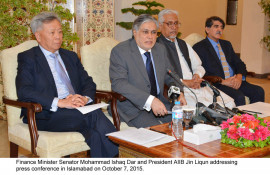
A new international order seems to be emerging defined overwhelmingly by geo-economics rather than geopolitics. In this new order, the old multilateral institutions created under American auspices, or what is known as the Washington Consensus, no longer seem as effective or capable of addressing global problems as they were just a decade ago. Geo-economics has been defined by its proponents in two different ways: as the relationship between economic policy and changes in national power and geopolitics; or as the economic consequences of trends in geopolitics and national power. Both the notions that ‘trade follows the flag’ and that ‘the flag follows trade’ point to what is called geo-economics.
Britain’s decision to join China’s new Asian Infrastructure Investment Bank (AIIB) is a telling example of one of the key realities of the new international order. Britain recognises how economically important the Far East has become, and just how high the potential costs of exclusion might be from the region China dominates. This also throws into bold relief America’s reduced ability to influence the foreign policies of even its closest and formerly most reliable allies. The AIIB’s establishment has been welcomed by most regional countries vastly lacking in infrastructure and acutely short of resources to fund projects that are to be financed by the Bank. But then, the AIIB also enables China to employ its growing economic leverage to achieve long-term geopolitical goals in the region, as well as internationally.
By signing up as a member of the AIIB, Britain is becoming a player in a wider geopolitical and geo-economic game. As a recently released report by the World Economic Forum points out, some of the real losers of the new international order are the global institutions like the World Bank, the Asian Development Bank and the International Monetary Fund, associated with American hegemony.
The setting up of the China-Pakistan Economic Corridor and the creation of a new ‘Silk Road’, linking Beijing to its immediate neighbours, will not only dramatically increase regional productivity and trade, it is expected to stand as an enduring, very tangible expression of China’s material centrality in Asia and beyond. The so-called Beijing Consensus is gaining ground over its rather discredited rival from Washington. This is why the US is said to be so concerned about what might otherwise be seen as a welcome, productive and positive expression of China’s growing economic power.
The struggle to define the norms, rules and practices that will determine the environment in which states and corporations operate in the 21st century is said to be one of the most important expressions of heightened geo-economic competition. Nation-states are coming to realise that war is no longer a viable option for remaining in control. Seeing this, competitive nations are shifting their resources towards science, education, production and trade. Now with even more lethal weapons in existence, the disastrous consequences of wars between nations have become even more obvious. This may prevent nations from engaging in large-scale wars with one another in the future. Not only are geopolitics and geo-economics intimately linked, but the latter is expected to increasingly trump the former in the absence of outright war. Wars by commercial means are becoming the principal focus of inter-state competition.
Already, Pakistan has reached the point of zero-sum on nuclear weapons capability with India. So a frontal war is no more an option for either India or Pakistan. With the entire world watching the two nuclear-armed South Asian neighbours very closely, cross-border militancy perpetrated by non-state actors is also hopefully off their respective strategic planning boards. So, it would be on the economic front that the two rivals are most likely to confront each other in the future. Or perhaps cooperate with each other. There is vast asymmetry between the two countries with India far ahead of Pakistan, economically, as well as in many other aspects. We, therefore, need to urgently readjust our position regionally and internationally to face the realities of this geo-economics-led new order. And as a first step towards achieving this goal, we should be shifting our resources from geo-strategic matters to geo-economic subjects like science, education, production and trade.
Published in The Express Tribune, November 4th, 2015.
Like Opinion & Editorial on Facebook, follow @ETOpEd on Twitter to receive all updates on all our daily pieces.
























1711457205-0/US-Baltimore-Bridge-Collapse-(1)1711457205-0-270x192.webp)




















COMMENTS (8)
Comments are moderated and generally will be posted if they are on-topic and not abusive.
For more information, please see our Comments FAQ